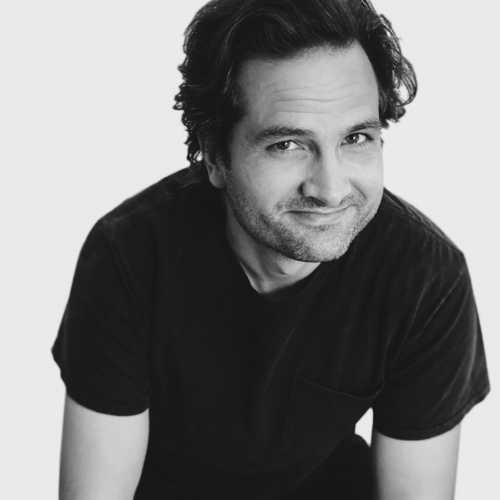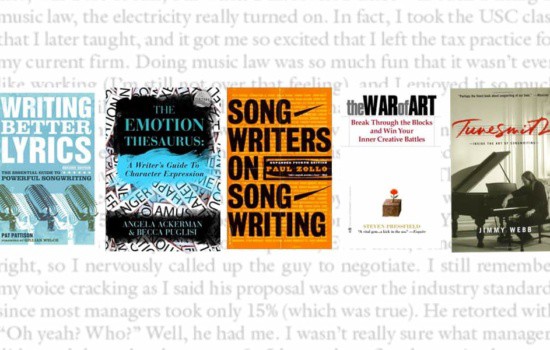Music Career Finder
Start Here:
Lyricist
Career Overview
A Lyricist writes the words to a song, then seeks to have the song performed on a recording or in musicals, usually by a recording/performing artist.
Alternate Titles
Lyric Writer, Staff Writer, Songwriter
Avg. Salary
$58,672
Salary Range
$49k – $92k per year

How To Become a Lyricist
- A lyricist writes the words to a song
- A lyricist specializes in writing the words to a song, while a songwriter writes lyrics and music together
- You can be a freelance lyricist or a staff writer for a publishing company
- To become a career lyricist, you may have to move to a music city
- Collaborating with others is an essential skill of a lyricist
- The average annual income for a lyricist in the United States can range from $49k to $92k (but you may not make anything in the beginning)
- Career Description
- Salary
- Career Outlook
- Career Path
- Experience & Skills
- Education & Training
- How to Get Started
- Sources
- References
Career Description
Lyricists write the lyrics (i.e. the words) to songs. Usually, they are also songwriters, writing music and words together, but not always.
There are two main types of lyricists: freelance lyricists and staff writers.
Freelance Lyricist
Freelance lyricists are self-employed writers who write songs solo and with other musicians.
Then they pitch their songs to publishing companies and artists.
Their goal, whether pitching to a publisher or to an artist directly, is to get an artist to record and release their song.
Staff Writer
Staff writers are salaried workers a publishing company employs to write songs for the publisher’s roster of artists.
They, too, write both individually and with other songwriters and musicians, and sometimes with the artists themselves.
A Day in the Life of a Lyricist
A typical workday for a career lyricist involves writing lyrics and songs, usually with others.
It can also include reading inspirational works, like poetry, a novel, and other people’s song lyrics.
A lyricist typically works in a music city, writing in living rooms, recording studios, and songwriting camps with other lyricists, songwriters, and musicians.
If you’re in a music city, you may not need to travel outside of that city for work, unless you want to collaborate with someone from somewhere else. But in that case, you could write songs with someone via a video call.
Grammy-nominated lyricist Pamela Phillips-Oland describes what her typical day looks like:
- First co-writing session at 10 a.m.
- Writes for 2-3 hours
- Lunch
- Second co-writing session in the afternoon until the end of the day
Lyricist vs. Songwriter
Lyricists specialize in writing the words to a song while a songwriter writes both the words and the music together.
Many lyricists are also songwriters, but not always. Lyricists who don’t also create the music often team up with musicians or songwriters to pair their words with music.
Writing Lyrics With Others
If you only write lyrics, you will need to partner with a musician to help you put music to your words.
That’s why if you’re also a musician, that can help you stand out from the crowd.
Grammy-nominated songwriter Justin Tranter (Britney Spears, Gwen Stefani, Linkin Park) said collaborating with others is a good way for him to get out of his bubble and help artists.
“It was such a relief to not think about myself,” he said of working with artists.
“…So to be able to work with artists and be like, ‘Alright, I’ve known of you for this many years…I can help you figure out what’s the next step because I can see from the outside and you can’t.’”
Phillips-Oland said writing with others is “very intimidating when you first start it.”
“…If you’re working with someone else and they come up with a better idea, you start to feel dreadful,” she said. “You feel like, ‘Am I holding my own in this collaboration?’”
This comparative fear is something every lyricist, songwriter, musician, and creative person struggles with at some point.
But she said, “Don’t worry about that.” she said.
“…It’s your job as a collaborator to make sure your collaborator looks fabulous. That’s your only job. And they do it for you, too.”
She said the best songs are written with pushback. If you’re willing to take feedback, it makes the song better.
Salary
The hourly wage, on average, for a lyricist can range from $9.45 to $26.32 per hour, or about $49k to $92k per year.
How Lyricists Are Paid
Lyricists (and songwriters) are paid a few different ways, depending on the situation.
Here are the main forms of income for a lyricist:
- Mechanical royalties: earned from the sale (or stream) of a song (set by the Copyright Royalty Board, currently 12.4 cents)
- Performance royalties: earned when a song is performed on the radio, on TV, during a live performance, or played in a public place (like a venue, coffee shop, or restaurant)
- Synchronization fees: an upfront fee to license and use a song on a TV show, in an advertisement, in a film, or in a video game
- Advances: essentially a zero-interest loan that’s recouped through the royalties generated from a lyricist’s song
- Grand rights (unique and uncommon): payments for a dramatic song used in plays, operas, and ballets (usually negotiated with the producer upfront)
Staff writers receive a weekly salary, which could be part of their advance.
Freelance lyricists earn income through selling their songs to a music publisher.
Publishing Deals
A publishing deal is an agreement between a songwriter (or lyricist) and a music publishing company.
This deal gives the publisher certain rights to the lyricist’s songs.
It typically involves the publisher getting an artist to record, release, and perform the lyricist’s songs, securing placements in films, TV shows, and commercials, and collecting royalties on behalf of the songwriter.
In exchange, the publisher takes a percentage of the earnings generated from those songs.
The typical publishing split is 50/50, but in order to get your work out there, Phillips-Oland said beginners should not “be afraid to give away 100% of your publishing early on. As you go on, you can keep more of it.”
Where To Register Your Songs
Here’s where to register your songs so that you get paid as a lyricist:
- A Performance Rights Organization (like ASCAP, BMI or SESAC)
- Sign a deal with a publisher
- A publishing admin company (if you’re not signed to a publisher)
- The Mechanical Licensing Collective (unless your publisher or publishing admin company partners with them)
Hey, what do you think about trying our new Music Career HelperMusic Career Helper really quick? It’s totally free and could help get your career moving fast! Give it a try. It’s totally free and you have nothing to lose.
Career Outlook
Artists, especially those who are not primarily songwriters or are more focused on singing and performing, are always looking for new songs.
So there will always be a high demand for the most talented writers.
It’s a hypercompetitive industry, so it is important to be prepared (and lucky).
Success depends not only on writing ability, but also on positioning in the market, and networking for opportunities to write professionally.
Artificial Intelligence and Lyricists
Artificial intelligence music is becoming more prevalent, but it’s unclear right now how that will affect lyricists.
Programs like Suno and ChatGPT can write lyrics with just a simple prompt.
It’s definitely something to keep in mind and to keep an eye on.
Career Path
So how do you become a lyricist?
Here’s a simplified version of a path you can take:
- Move to a music city (like Nashville, Los Angeles, Austin, or New York)
- Join a songwriters group
- Write with other songwriters (especially if they already have a publishing deal)
- Record a demo of your best song(s) (either you or someone else singing/playing)
- Pitch your song to publishers
- Repeat every day
This is not an easy field to break into. It’s very competitive and it can be hard to get your work noticed.
But there are still career opportunities for lyric writers.
Advancement in this role can mean working with higher-earning and better-known artists, or a songwriter who already has a publishing deal, which will increase your chances of getting your work heard.
Phillips-Oland said she went to where the opportunities were.
“The things that have happened for me have happened because I just was in the right place at the right time and things happened,” she said.
Meeting people and being active is how Grammy-nominated and award-winning songwriter Julia Michaels (Shawn Mendes, P!nk, Olivia Rodrigo) got her start.
“Just word of mouth, really,” she said about her beginnings. “Doing [songwriting] sessions. …And meeting new people, and I was doing demo work around the city so that I could meet people.”
Recording a Demo
When you pitch a song, make sure you have a demo – a simple recording of your song.
“Nobody is going to look at a lyric you send in,” she said. “You have to demo it and you do have to copyright it if you send it in because copyright will protect you.”
Phillips-Oland said you should have no more than three songs on your demo CD, or don’t send a publisher more than three at a time.
Contacting a Publisher
When you do contact a publisher, call them and get permission.
“Speak to somebody in the office,” she said. “Be sure that you have a name to send them. You have to have permission to send it. If you send a demo in without them requesting it, they will put it in the trash, only because they don’t want to be accused of stealing your idea. It all has to do with copyright and permission.”
She said you could even send it to “Jane the assistant” if she gives you permission.
Pitching To an Artist
You can also approach artists directly to see if they want to work with you or record your song.
She said you could say to them:
- “I think I could be a great collaborator for you, do you want to write a song together?”
- “Do you have a melody or track that I could write something for? You don’t have to use it.”
- “Can you look at one lyric of mine?”
Should You Sing On Your Demos?
What about singing your own songs, either on your demo or as an artist?
That’s definitely one way to get your songs out there, but it’s not necessary, said Phillips-Oland.
“Don’t sing your own songs if they’re not good for your own voice,” she said.
“Get someone else to sing the demo. If your sister-in-law or your cousin wants to sing it, they may be willing to do it for nothing, but it could be very expensive because it could cost you [the deal]. Because they may not know how to do it. They may just want tape on themselves. They may want to get into the studio and get something to pitch themselves with. So it’s using common sense.”
Experience & Skills
The biggest skill you must learn is how to keep a song simple, relatable, and interesting.
Here are the skills and experience you need to develop, according to Phillips-Oland:
- Write simply
- Make the lyrics relatable and not so specific to you that you lose the listener
- Be able to work within a framework (i.e. song structure, guidelines from your publisher, etc.)
- Start making your point in the first line of the song
- Write only in genres you aren’t innately familiar with
- Have an optimistic attitude
- Be easy to work with
- Learn an instrument
- Learn how to record a basic demo
- Know some music theory
She said another skill you need is resilience. You need to be able to take feedback well and not crumble beneath it.
“I’d say that if you fall apart under criticism and it continues and you don’t learn to be stronger, then you’re not cut out to be in the entertainment business,” she said.
“Because it can take one week or it can take ten or fifteen years before you have your break. And some people never have a break, but you do it because you love it. I think that you can create your own breaks sometimes.”
Education & Training
You don’t need traditional schooling to become a career lyricist. Many career songwriters did not go to school for anything music-related.
Going To School
However, learning the basics of writing and poetry can be very helpful, so taking English or poetry classes could be a good idea.
But Phillips-Oland said you need to know the difference between writing poetry and writing song lyrics.
“This is the essential training that lyricists must have: the ability to tell a poem from a lyric,” she said.
“First of all, poetry is of your mind. Songs are of your heart. A lyric should be conversational. It should be accessible. It should be like a conversation between two people. It’s sung by somebody, to somebody, and it’s very immediate.”
Learning From the Greats
She said you can get a solid education from listening to the songs from the Great American Songbook (here’s a playlist) and others who have written successful songs, like Hoagy Carmichael, Irving Berlin, Ella Fitzgerald, Sarah Vaughn, and Don McLean.
“Put in the names of 1950s songs, 1960s songs, 1970s songs, 1940s songs,” she said.
“Some of it is drivel. Some of it is dreck. Some of it is great and you have to start to learn to know the difference where you can see that ‘this is just a copy of everything else and it was ok but it wasn’t great‘ and ‘my God what a terrible rhyme or what a terrible line.’”
Experiencing Life
Another way to train yourself as a lyricist is to live life.
As songwriter Aaron Espe said, writing songs involves “living your life and paying attention and then writing stuff down.”
Michaels has similar advice, saying it’s okay if you don’t feel like writing and need to go experience something. You can’t force a song.
“If you don’t feel like writing one day and you want to go to the movies or you want to go to the beach…,” she said, “then go to the beach, go to the movies.”
Yes, work hard at honing your lyric-writing skills. But also take breaks and absorb life experiences, otherwise you won’t have anything to pull from when writing.
How to Get Started
If you want to become a lyricist, the path is simple but not easy: write a lot, finish songs, and get your words in front of real musicians. You do not need “permission” to start. You need reps, feedback, and a few people who trust you enough to write with you. Here’s a clean step-by-step path from zero experience to getting paid locally.
-
Write every day and keep an idea bank.
Your job is collecting lines. Carry a notes app or a small notebook and dump everything into it: titles, overheard phrases, weird metaphors, emotional one-liners, anything. Then write daily, even if it’s only eight lines. Your first month will be rough. Good. That means you’re actually writing. Try a simple rule: one finished verse or chorus draft per day. Later, you can steal from your own idea bank when you hit a wall.
-
Practice writing to prompts, not just your feelings.
Most paid lyric work is solving a problem: “We need a chorus that hits harder,” or “Write a verse that matches this vibe.” Start training now. Pick a random topic and write a chorus in 20 minutes. Then do the same topic in a different genre the next day. This is how you become useful in sessions. Bonus: writing to prompts keeps you from writing the same song over and over with different names in the second verse.
-
Reverse engineer lyrics you love and steal the moves.
Take five songs you’re obsessed with and study the mechanics. Where does the title show up? How fast does the story start? How often do they use images versus feelings? Copy the structure and write new lyrics with your own story. That’s not cheating, that’s training. You’re learning the “blueprints” behind great songs, so you can build your own without guessing.
-
Finish songs on a schedule, not when inspiration shows up.
Talent is cute, finishing is what gets you hired. Set a goal you can actually hit: one complete lyric per week (verses, chorus, and a bridge if it needs it). Even if it’s not perfect, finish it. Then rewrite it once. You’ll get faster and cleaner fast. Most beginners stay stuck in endless “almost done” drafts. Don’t be that person.Pro tip: “Done” beats “perfect.” You can’t improve a song you never finish. -
Co-write with musicians who need words.
Lyricists level up when they write with singers, producers, and bands. Find people who already make music but struggle with lyrics. Show up prepared with ideas, titles, and hooks. Keep the vibe easy: listen first, pitch second. Co-writing also teaches you what lyrics feel like on a melody, which is where a lot of “good on paper” lines go to die.
-
Build a tiny portfolio of your best 3 to 6 pieces.
Pick your strongest work and make it easy to share. You can have two types: lyrics on a page (clean, readable) and simple demos (even phone-recorded) that show how the words sit in a song. Keep it short. Nobody wants a 30-song folder from a beginner. They want proof you can land a hook, tell a story, and write a chorus that sticks.
-
Get feedback in public places, not just from your best friend.
Friends are supportive. Strangers are useful. Join songwriting communities where people actually critique: local meetups, school music clubs, songwriting subreddits, and Discord communities for writers and producers. Post one chorus, ask one specific question, and accept the answers without spiraling. The goal is not validation. The goal is getting better.
-
Start small paid gigs and treat them like real work.
Look for local artists who need help finishing songs: open mics, small studios, community theater, student filmmakers, indie bands. Offer a clear service: rewrite a chorus, polish verses, or write lyrics to an existing melody. If you’re charging, keep it simple: a flat fee for a rewrite or a per-song rate. Be on time, meet deadlines, and communicate like a pro. Reliability gets you hired again.
-
Handle credits and splits like an adult.
If you co-write, talk about credit and percentage splits right away. Awkward? Yes. Necessary? Also yes. Keep a simple written record of who wrote what and when, even if it’s just a shared note everyone agrees to. Save files, track versions, and keep your contact info attached to your work. When money shows up, it’s too late to “figure it out later.”Reality check: the fastest way to lose opportunities is being messy with credit, deadlines, or communication.
Sources

Pamela Phillips-Oland
Pamela Phillips-Oland is a Grammy-nominated lyricist whose songs have been recorded by Frank Sinatra, Whitney Houston, Aretha Franklin, Selena, The Jacksons, Peabo Bryson, Reba McIntyre and Gladys Knight, to name a few.
She co-wrote the most successful musical in Dutch history, Soldier of Orange, and has written songs for film and TV projects such as 102 Dalmatians, Xena: Warrior Princess, and The Sopranos. She is the author of two books on songwriting, The Art of Writing Great Lyrics (view it via Goodreads or Scribd) and The Art of Writing Love Songs.
Phillips-Oland has taught lyric writing courses at UCLA, Academy of Contemporary Music (London), and Songsalive. Her work has been featured in the LA Times, Swaay and on the Storybeat podcast.
Her discography can be viewed via Discogs or Genius.com and her bibliography via Amazon or Simon and Schuster. Her Broadway and theatre credits can be viewed via Broadway World.

Aaron Espe
Aaron Espe is a Nashville-based songwriter/artist whose songs have been on ABC and CMT, in shows Grey’s Anatomy and Orange Is The New Black, and his song “Anytime I Go” was featured in a Stella Artois campaign. He’s worked with Brian F. Joseph, who has produced Bon Iver and Sufjan Stevens. Taylor Swift caught wind of his song “Making All Things New” and added it to her playlist “Songs Taylor Loves.” Through Nettwerk Records, he released the EP Through Frozen Forests, which peaked at #7 on the iTunes Singer/Songwriter chart.
He’s also the author of On Songwriting: Practical Tips and Insights from a Decade in Music City, which has garnered praise from Leigh Nash (frontwoman of Sixpence None The Richer), Philip Philips (certified Platinum recording songwriter/artist and 2012 American Idol winner), Barry Dean (Grammy-nominated hit songwriter for Little Big Town, Tenille Townes, Ingrid Michaelson), Isaac Slade (co-founder of Grammy-nominated band, The Fray) Ben West (songwriter and producer for P!nk, Tim McGraw, Lady Antebellum), and Bonnie Baker (songwriter for Reba McEntire, Hunter Hayes, Rachel Platten).
References
- 1Multiple. "Lyricist salary". careerexplorer. published: 2018. retrieved on: Oct 9, 2024
- 2Multiple. "Lyrics Writer Salaries in United States". Glassdoor. published: June 6, 2024. retrieved on: Oct 9, 2024





